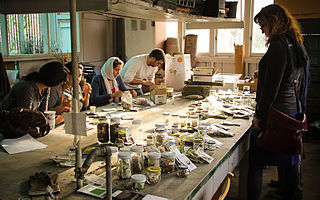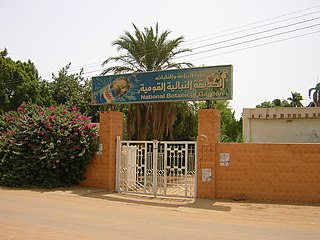
A seed bank stores seeds to preserve genetic diversity; hence it is a type of gene bank. There are many reasons to store seeds. One is to preserve the genes that plant breeders need to increase yield, disease resistance, drought tolerance, nutritional quality, taste, etc. of crops. Another is to forestall loss of genetic diversity in rare or imperiled plant species in an effort to conserve biodiversity ex situ. Many plants that were used centuries ago by humans are used less frequently now; seed banks offer a way to preserve that historical and cultural value. Collections of seeds stored at constant low temperature and low moisture are guarded against loss of genetic resources that are otherwise maintained in situ or in field collections. These alternative "living" collections can be damaged by natural disasters, outbreaks of disease, or war. Seed banks are considered seed libraries, containing valuable information about evolved strategies to combat plant stress, and can be used to create genetically modified versions of existing seeds. The work of seed banks often span decades and even centuries. Most seed banks are publicly funded and seeds are usually available for research that benefits the public.

Phaseolus coccineus, known as runner bean, scarlet runner bean, or multiflora bean, is a plant in the legume family, Fabaceae. Another common name is butter bean, which, however, can also refer to the lima bean, a different species.

In agriculture and gardening, seed saving is the practice of saving seeds or other reproductive material from vegetables, grain, herbs, and flowers for use from year to year for annuals and nuts, tree fruits, and berries for perennials and trees. This is the traditional way farms and gardens were maintained for the last 12,000 years.

VanDusen Botanical Garden is a botanical garden situated in Vancouver, British Columbia, in the Shaughnessy neighborhood. It is located at the northwest corner of 37th Avenue and Oak Street. It is named for local lumberman and philanthropist Whitford Julian VanDusen.

Seed companies produce and sell seeds for flowers, fruits and vegetables to commercial growers and amateur gardeners. The production of seed is a multibillion-dollar global business, which uses growing facilities and growing locations worldwide. While most of the seed is produced by large specialist growers, large amounts are also produced by small growers who produce only one to a few crop types. The larger companies supply seed both to commercial resellers and wholesalers. The resellers and wholesalers sell to vegetable and fruit growers, and to companies who package seed into packets and sell them on to the amateur gardener.

An heirloom plant, heirloom variety, heritage fruit, or heirloom vegetable is an old cultivar of a plant used for food that is grown and maintained by gardeners and farmers, particularly in isolated communities of the Western world. These were commonly grown during earlier periods in human history, but are not used in modern large-scale agriculture.
Kent Whealy was an American activist, journalist and philanthropist who co-founded Seed Savers Exchange and promoted organic agriculture and the saving of heirloom seeds. Raised in Wellington, Kansas he was inspired by the works of agricultural geneticists Jack Harlan and H.Garrison Wilkes to use his training in communications to promote the protection of genetic diversity in agriculture.
Dan Jason is a Canadian active in food politics, as an opponent of genetically modified foods and proponent of heirloom plants and seedbanks. He is a writer, lecturer, and runs a business providing heirloom seeds.
This is an alphabetical index of articles related to gardening.
Seed Savers Exchange, or SSE, is a non-profit organization based near Decorah, Iowa, that preserves heirloom plant varieties through regeneration, distribution and seed exchange. It is one of the largest nongovernmental seedbanks in the United States. The mission of SSE is to preserve the world’s diverse but endangered garden heritage for future generations by building a network of people committed to collecting, conserving, and sharing heirloom seeds and plants, and educating people about the value of genetic and cultural diversity. Since 1975, Seed Savers has produced an annual yearbook of members’ seed offerings, as well as multiple editions of The Garden Seed Inventory, and The Fruit, Nut and Berry Inventory. SSE also publishes Seed to Seed: Seed Saving and Growing Techniques for Vegetable Gardeners. The nonprofit has sold seeds to about 600 retail stores in the United States and Canada.

Morgan Carrington "Cary" Fowler Jr. is an American agriculturalist and the former executive director of the Crop Trust, currently serving as U.S. Special Envoy for Global Food Security.

Red Fife wheat is a Canadian landrace descendant of wheat from Galicia, Eastern Europe, its old local Galician name being “Halychanka”. It is a hard, bread wheat with straws 0.9 to 1.5 metres tall.

A pumpkin, in English-language vernacular, is a cultivated winter squash in the genus Cucurbita. The term is most commonly applied to round, orange-colored squash varieties, though it does not possess a scientific definition and may be used in reference to many different squashes of varied appearance.

Seed swaps are events where gardeners meet to exchange seeds. Swapping can be arranged online or by mail, especially when participants are spread out geographically. Swap meet events, where growers meet and exchange their excess seeds in person, are also growing in popularity. In part this is due to increased interest in organic gardening and heritage or heirloom plant varietals. This reflects gardeners' interest in "unusual or particular varieties of flowers and vegetables", according to Kathy Jentz of Washington Gardener Magazine (Maryland).

A seed library is an institution that lends or shares seed. It is distinguished from a seedbank in that the main purpose is not to store or hold germplasm or seeds against possible destruction, but to disseminate them to the public which preserves the shared plant varieties through propagation and further sharing of seed.
Seed of Diversity, Semences du patrimoine, is a Canadian charitable organization that aims to "search out, preserve, perpetuate, study, and encourage the cultivation of heirloom and endangered varieties of food crops", particularly Canadian plants, and to educate the public about their use. It has been called "The Canadian NGO leader in two key areas of food system sustainability: crop genetic diversity and the redesign of pollination strategies".

Heather Elizabeth Apple is a Canadian writer, artist, and educator, with an interest in organic horticulture. She was awarded a 125th Anniversary of the Confederation of Canada Medal in 1992.
The Seed Savers' Network (SSN) is an Australian not-for-profit organisation, based in Byron Bay, New South Wales. Since 1986, SSN has organised gardeners and farmers to collect, multiply and redistribute garden seeds in Australia and also within peasant organisations worldwide.

The Sudan National Botanical Garden, established in 1954, is located in Khartoum in the Mogran residential area. The garden contains a collection of living plants in addition to a herbarium.













